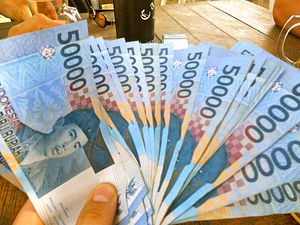Revisions to the Corruption Eradication Commission (KPK) Law, the first since its establishment in 2002, passed a House below quorate in less than four minutes — an absolute feat if it weren’t for how damaging it will prove to be in the fight against corruption. The revisions were drafted without consultation from legal experts, the public, or the KPK itself. Critics and civil society say the revisions are self-interested and will allow rampant corruption after essentially neutralizing the agency.
Brief analysis from Tempo lays out the bones of the revisions and what immediate impacts the articles will have. Changes in the definition of the agency itself will damage the structure of the KPK — the agency will be operated as an arm of the government, while investigators will now fall under the Civil Servants Law. The revision sparking the most fear, however, is to wiretapping procedures which have been widely seen as the agency’s death nail. Previously, investigators have been free to wiretap suspects under investigation but will now be forced to seek approval from a Supervisory Board. Critics say the establishment of this Board by the DPR will give lawmakers, often the target of KPK investigations, the ability to sink investigations of their own ranks before they begin.
In his second term, President Jokowi is looking to formalize his legacy. The most blatant of these moves is the moving of the capital from Jakarta to a new site in Kalimantan. But increasing foreign investment and, in turn, funding ambitious infrastructure projects across the archipelago or create thriving skilled worker industries is the other strategy.
Corruption in public institutions has historically been the major hurdle in keeping foreign business away and seen Indonesia flail towards the middle of the global Transparency International rankings. Still, since predecessor president Susilo Bambang Yudhoyono and the creation of the KPK perceptions have improved. The 2018 ranking shows a slight drop but generally within the middle band, sitting at 89 of 180, though trailing neighbors Malaysia and Singapore.
Changes to the law, Transparency International warns, will almost certainly see an erosion of the work the agency has accomplished. “Attempts to weaken the independence and authority of the KPK have serious potential to undermine its commendable anti-corruption efforts in recent years,” Transparency International chairwoman Delia Ferreira Rubio said in a statement issued September 10. That weakening is precisely the point of the revisions, but if the president will not respond to calls from hard-working activists and experts at home, perhaps he will listen to the international business community.
Recent revelations from the World Bank found that amid the US-China trade war, the manufacturing sector had chosen to exit China and set up shop in Southeast Asia. Vietnam and Cambodia picked up the large majority of the 33 Chinese-owned firms, with none deciding on Indonesia. The Mekong states fare far worse in the Transparency Index, but ease of doing business outstrips Indonesia. Touted revisions to the Labor Law in an effort to attract similar firms may very well be off-set by a sharp decline in corruption-busting efforts and a widespread perception that the days of a reforming Indonesia are behind us.
The concerns of the international business community pale in comparison to the deep disillusionment amongst some of Jokowi’s most ardent supporters in 2014. The same voters who showed up en masse in 2014 and turned out in support of him and the KPK amid the early-2015 showdown with the police are now staging funerals for the anti-corruption agency. Civil society organizations and legal aid bodies are set to challenge the revisions in the Constitutional Court and, according to Simon Butt, the associate director for the Centre for Asian and Pacific Law at the University of Sydney, that outcome is hard to predict with the Court ruling both in favor and against the KPK previously. Butt adds that Jokowi does have the option to issue emergency laws, but he sees the president as unlikely to do so.
The damage has been done. The spectre of Suharto and the New Order has been raised and unless he pushes back swiftly and quickly against the DPR, his legacy will be far different from what he has planned.

































